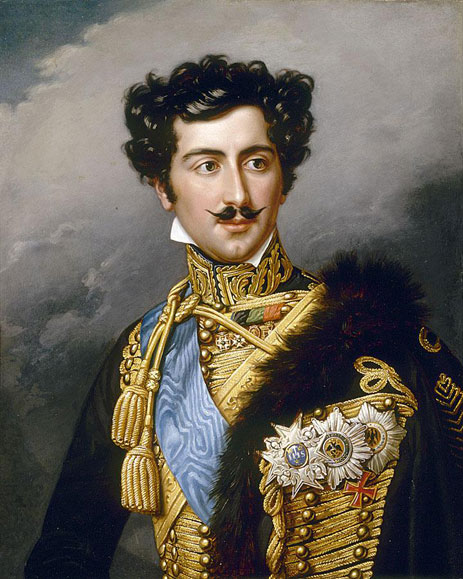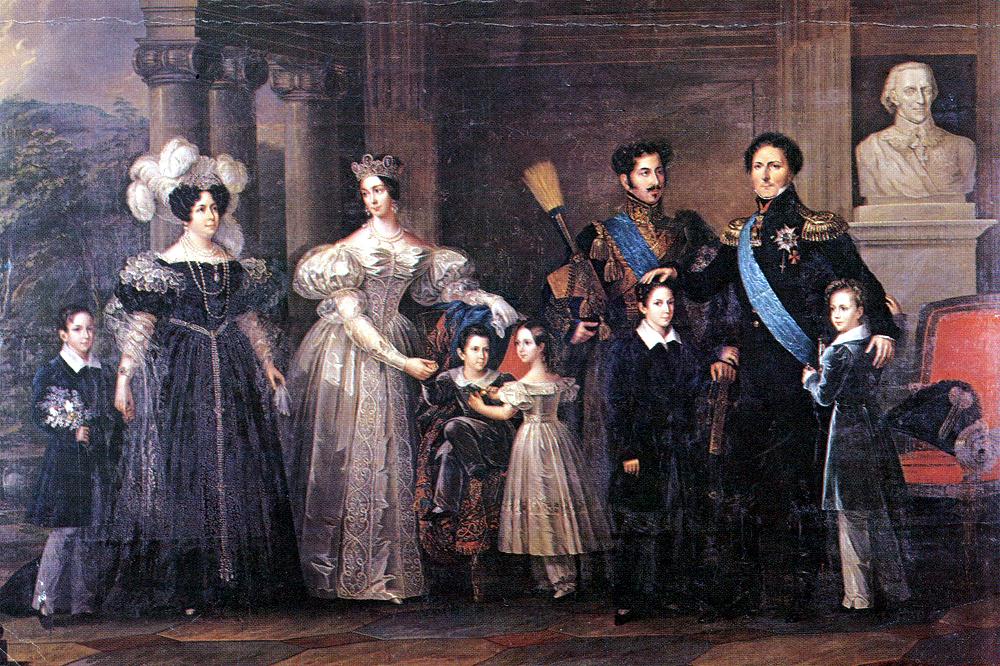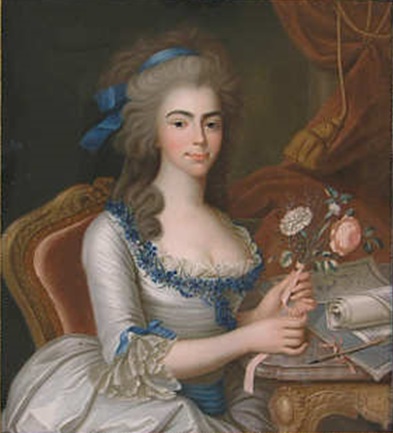|
Amélie Of Leuchtenberg
Amélie of Leuchtenberg (; ; 31 July 1812 – 26 January 1873) was List of Brazilian consorts, Empress of Brazil as the wife of Pedro I of Brazil. She was the granddaughter of Josephine de Beauharnais, Empress of the First French Empire, French. Her father, Eugène de Beauharnais, was the only son of Empress Josephine and her first husband Alexandre, Viscount of Beauharnais. He thus became a stepson of Napoleon Bonaparte when his mother married the future emperor. The mother of Empress Amélie was Princess Augusta of Bavaria, Princess Augusta, daughter of Maximilian I Joseph of Bavaria, Maximilian I, King of Kingdom of Bavaria, Bavaria. Family, childhood and youth Amélie was the fourth child of General Eugène de Beauharnais, Duke of Leuchtenberg and his wife Princess Augusta of Bavaria. Her father was the son of Joséphine de Beauharnais and her first husband, Viscount Alexandre de Beauharnais. When Joséphine remarried, to Napoleon Bonaparte, Eugène was adopted by the latte ... [...More Info...] [...Related Items...] OR: [Wikipedia] [Google] [Baidu] |
Duchess Of Braganza
The title of Duchess of Braganza has existed in Portugal since the 15th century. This title designates the female head of the House of Braganza. Duchess of Braganza House of Braganza Claimants (prior 5 October 1910 revolution, 5 October 1910) Claimants (post 5 October 1910 revolution, 5 October 1910) See also *Princess of Portugal *Princess of Brazil *Princess Royal of Portugal *List of Portuguese consorts *List of Brazilian consorts References {{Portuguese royalty Duchesses of Braganza, Lists of duchesses, Braganza Lists of Portuguese people ... [...More Info...] [...Related Items...] OR: [Wikipedia] [Google] [Baidu] |
First French Empire
The First French Empire or French Empire (; ), also known as Napoleonic France, was the empire ruled by Napoleon Bonaparte, who established French hegemony over much of continental Europe at the beginning of the 19th century. It lasted from 18 May 1804 to 6 April 1814 and again briefly from 20 March 1815 to 7 July 1815, when Napoleon was exiled to Saint Helena. Although France had already established a French colonial empire, colonial empire overseas since the early 17th century, the French state had remained a France in the early modern period, kingdom under the Bourbons and a French First Republic, republic after the French Revolution. Historians refer to Napoleon's regime as the ''First Empire'' to distinguish it from the restorationist ''Second French Empire, Second Empire'' (1852–1870) ruled by his nephew Napoleon III. On 18 May 1804 (28 Floréal year XII on the French Republican calendar), Napoleon was granted the title Emperor of the French (, ) by the French and w ... [...More Info...] [...Related Items...] OR: [Wikipedia] [Google] [Baidu] |
Auguste De Beauharnais, 2nd Duke Of Leuchtenberg
Auguste Charles Eugène Napoléon de Beauharnais, Duke of Leuchtenberg (9 December 1810 – 28 March 1835) was the first prince consort of Maria II of Portugal. Besides being the 2nd Duke of Leuchtenberg and 2nd Prince of Eichstätt, he also held the Brazilian noble title of Duke of Santa Cruz. Family Being born in Milan, Lombardy, Auguste was the eldest son of Eugène de Beauharnais, Napoleon I's stepson, and Princess Augusta of Bavaria. His dynastic connections were exceptional, considering his paternal lineage: among his sisters were Joséphine, Queen consort of Oscar I of Sweden, and Amélie, Empress consort of his future father-in-law Pedro I of Brazil. Later, his brother Maximilian would wed Grand Duchess Maria Nikolaevna of Russia, eldest daughter of Tsar Nicholas I. Duke of Leuchtenberg His maternal grandfather, King Maximilian I of Bavaria, had given Eugène the title "Duke of Leuchtenberg" on 14 November 1817, after the loss in 1815 of his Napoleonic titles a ... [...More Info...] [...Related Items...] OR: [Wikipedia] [Google] [Baidu] |
Oscar I Of Sweden
Oscar I (born Joseph François Oscar Bernadotte; 4 July 1799 – 8 July 1859) was King of Sweden and List of Norwegian monarchs, Norway from 8 March 1844 until his death. He was the second monarch of the House of Bernadotte. The only child of King Charles XIV John, Oscar inherited the thrones upon the death of his father. Throughout his reign he would pursue a liberal course in politics in contrast to Charles XIV John, instituting reforms and improving ties between Sweden and Norway. In an address to him in 1857, the Riksdag declared that he had promoted the material prosperity of the kingdom more than any of his predecessors. Early life and family Oscar was born at 291 Rue Cisalpine in Paris (today: 32 Rue Monceau) to Jean-Baptiste Jules Bernadotte, then-French Ministry of War (France), Minister of War and later Marshal of the Empire and Sovereign Prince of Pontecorvo, and Désirée Clary, Napoleon, Napoleon Bonaparte's former fiancée. He was named ''Joseph'' after his godfat ... [...More Info...] [...Related Items...] OR: [Wikipedia] [Google] [Baidu] |
Josephine Of Leuchtenberg
Josephine of Leuchtenberg (Joséphine Maximilienne Eugénie Napoléone de Beauharnais; 14 March 1807 – 7 June 1876), also Josefina, was Queen of Sweden and Norway from 8 March 1844 to 8 July 1859 as the wife of King Oscar I. She was also Princess of Bologna from birth and Duchess of Galliera from 1813. She was regarded as politically active during the reign of her spouse and acted as his political adviser, actively participating in government affairs. She is acknowledged as having introduced more liberal laws regarding religion. Early life Joséphine was born on 14 March 1807 in Milan, Italy. She was the first of six children of Eugène de Beauharnais, Duke of Leuchtenberg (1781–1824), and his wife, Princess Augusta of Bavaria (1788–1851). Her paternal grandmother and namesake was Joséphine Tascher de La Pagerie, the first wife of Napoleon; she was given the name 'Joséphine' by Napoleon's request.Robert Braun (1950). ''Silvertronen, En bok om drottning Josefine av Sv ... [...More Info...] [...Related Items...] OR: [Wikipedia] [Google] [Baidu] |
Princess Augusta Wilhelmine Of Hesse-Darmstadt
Princess Augusta Wilhelmina of Hesse-Darmstadt (; 14 April 1765 – 30 March 1796) was Palatine Zweibrücken, Duchess consort of Zweibrücken by marriage to Maximilian I Joseph of Bavaria, Maximilian, Duke of Zweibrücken and the mother of King Ludwig I of Bavaria. Biography Augusta Wilhelmina was born in Darmstadt, the fourth daughter and ninth child of Prince George William of Hesse-Darmstadt (second son of Louis VIII, Landgrave of Hesse-Darmstadt) and Countess Maria Louise Albertine of Leiningen-Falkenburg-Dagsburg. Marriage On 30 September 1785, in Darmstadt, Augusta Wilhelmina married Maximilian I Joseph of Bavaria, Maximilian, Count Palatine of Zweibrücken (later King Maximilian I Joseph of Bavaria). Maximilian was an officer in the French army stationed at Strasbourg, but the couple also often visited Paris. There, Augusta Wilhelmina met Queen Marie Antoinette, with whom she maintained an ongoing correspondence. In 1789, Maximilian's regiment rose in French Revolution ... [...More Info...] [...Related Items...] OR: [Wikipedia] [Google] [Baidu] |
Viceroy
A viceroy () is an official who reigns over a polity in the name of and as the representative of the monarch of the territory. The term derives from the Latin prefix ''vice-'', meaning "in the place of" and the Anglo-Norman ''roy'' (Old French ''roi'', ''roy''), meaning "king". This denotes the position as one who acts on behalf of a king or monarch. A viceroy's territory may be called a viceroyalty, though this term is not always applied. The adjective form is ''viceregal'', less often ''viceroyal''. The term ''vicereine'' is sometimes used to indicate a female viceroy '' suo jure'', although ''viceroy'' can serve as a gender-neutral term. Vicereine is more commonly used to indicate a viceroy's wife, known as the ''viceregal consort''. The term has occasionally been applied to the governors-general of the Commonwealth realms, who are ''viceregal'' representatives of the monarch. The position of a viceroy is by royal appointment rather than a noble rank. An individual vicer ... [...More Info...] [...Related Items...] OR: [Wikipedia] [Google] [Baidu] |
Alexandre De Beauharnais
Alexandre François Marie, Viscount of Beauharnais (; 28 May 1760 – 23 July 1794) was a French politician and general of the French Revolution. He was the first husband of Joséphine Tascher de La Pagerie, who later married Napoleon Bonaparte and became empress of France. Beauharnais was executed by guillotine during the Reign of Terror. Family Beauharnais was born to the noble Beauharnais family in Fort-Royal (now Fort-de-France), Martinique, in the French West Indies. He was the son of Governor François de Beauharnais, Marquis de la La Ferté-Beauharnais, and Marie Anne Henriette Françoise Pyvart de Chastullé. On 13 December 1779 in Paris, he married Joséphine Tascher de la Pagerie, the future Empress of France. They had two children, Eugène (1781–1824) and Hortense (1783–1837). Career Beauharnais began his military career in an infantry regiment at Martinique. He served in the American Revolutionary War under the Count of Rochambeau, and became acquainted with ... [...More Info...] [...Related Items...] OR: [Wikipedia] [Google] [Baidu] |
Joséphine De Beauharnais
Joséphine Bonaparte (, born Marie Josèphe Rose Tascher de La Pagerie; 23 June 1763 – 29 May 1814) was the first wife of Emperor Napoleon I and as such Empress of the French from 18 May 1804 until their marriage was annulled on 10 January 1810. As Napoleon's consort, she was also List of Italian royal consorts, Queen of Italy from 26 May 1805 until the 1810 annulment. She is widely known as Joséphine de Beauharnais () or Empress Joséphine. Joséphine's marriage to Napoleon was her second. Her first husband, Alexandre de Beauharnais, was guillotined during the Reign of Terror, and she was imprisoned in the Saint-Joseph-des-Carmes, Carmes prison until five days after his execution. Through her children by Beauharnais, she was the grandmother of Emperor Napoleon III of France and Empress Amélie of Brazil. Members of the current Dynasty, royal families of Swedish royal family, Sweden, Danish royal family, Denmark, Monarchy of Belgium, Belgium, and Norwegian royal family, ... [...More Info...] [...Related Items...] OR: [Wikipedia] [Google] [Baidu] |
Eugène De Beauharnais, Duke Of Leuchtenberg
Eugene is a common male given name that comes from the Greek εὐγενής (''eugenēs''), "noble", literally "well-born", from εὖ (''eu''), "well" and γένος (''genos''), "race, stock, kin". Henry George Liddell, Robert Scott, ''A Greek-English Lexicon'', on Perseus Gene is a common shortened form. The feminine variant is or Eugenie. Other male foreign-language variants include: People Notable people with the given name Eugene or Eugène include:Christianity *Eugene or |
Kingdom Of Bavaria
The Kingdom of Bavaria ( ; ; spelled ''Baiern'' until 1825) was a German state that succeeded the former Electorate of Bavaria in 1806 and continued to exist until 1918. With the unification of Germany into the German Empire in 1871, the kingdom became a federated state of the new empire and was second in size, power, and wealth only to the leading state, the Kingdom of Prussia. The polity's foundation dates back to the ascension of Elector Maximilian IV Joseph of the House of Wittelsbach as King of Bavaria in 1806. The crown continued to be held by the Wittelsbachs until the kingdom came to an end in 1918. Most of the border of modern Germany's Free State of Bavaria was established after 1814 with the Treaty of Paris, in which the Kingdom of Bavaria ceded Tyrol and Vorarlberg to the Austrian Empire while receiving Aschaffenburg and Würzburg. In 1918, Bavaria became a republic after the German Revolution, and the kingdom was thus succeeded by the current Free State of Ba ... [...More Info...] [...Related Items...] OR: [Wikipedia] [Google] [Baidu] |
Maximilian I Joseph Of Bavaria
Maximilian I Joseph (; 27 May 1756 – 13 October 1825) was Duke of Zweibrücken from 1795 to 1799, prince-elector of Bavaria (as Maximilian IV Joseph) from 1799 to 1806, then King of Bavaria (as Maximilian I Joseph) from 1806 to 1825. He was a member of the House of Palatinate-Birkenfeld-Zweibrücken, a branch of the House of Wittelsbach. Early life Maximilian, the son of the Count Palatine Frederick Michael of Zweibrücken-Birkenfeld and Maria Francisca of Sulzbach, was born on 27 May 1756 at Schwetzingen, between Heidelberg and Mannheim. After the death of his father of testicular cancer in 1767, he was left at first without parental supervision, since his mother had been banished from her husband's court after giving birth to a son fathered by an actor. Maximilian was carefully educated under the supervision of his uncle, Duke Christian IV of Zweibrücken, who settled him in the Hôtel des Deux-Ponts. He became Count of Rappoltstein in 1776 and took service in 1777 ... [...More Info...] [...Related Items...] OR: [Wikipedia] [Google] [Baidu] |




